IIPH Institute Advisory Board Members – Biographies
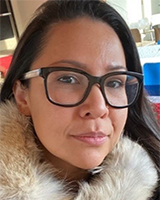
Karen Blondin Hall
Director, Cultural Safety and Anti-Racism, Department of Health and Social Services, Government of the Northwest Territories
Karen Blondin Hall is Sahtúgot’ı̨nę (person from Great Bear Lake) and grew up in Yellowknife, Northwest Territories (NWT). She currently works in Yellowknife as Director, Cultural Safety and Anti-Racism for the Government of the Northwest Territories, Department of Health and Social Services where she provides leadership to the organization’s system-wide approach to addressing anti-Indigenous racism. For almost a decade, Karen has worked with Indigenous peoples and communities across the NWT to set the strategic vision and actions to embed cultural safety and anti-racism across the NWT health and social services (HSS) system. This includes the development and delivery of mandatory in-person cultural safety and anti-racism training for NWT HSS staff.
She holds a BSc in Health Promotion from Dalhousie University and an MA in Studies in Policy and Practice from the University of Victoria where she focused her studies and research on Indigenous health inequities, Indigenous ways of knowing, and cultural safety.
Karen comes from a line of Indigenous Knowledge Holders and is passionate about incorporating Indigenous teachings and practices into her life both personally and professionally.

Paul Brassard
Associate Professor of Medicine, McGill University
Principal Investigator, Center for Clinical Epidemiology, Jewish General Hospital
Assistant Professor, Faculty of Medicine, School of Public Health, Department of Community and Preventive Medicine, Université de Montréal
Dr. Brassard is a clinician-scientist and teacher with postgraduate training in parasitology and epidemiology and a Fellow of the Royal College of Physician of Canada in public health and preventive medicine with special interest in communicable disease control and prevention and circumpolar health. He is an Associate Professor of Medicine at McGill University and a principal investigator in the Center for Clinical Epidemiology of the Jewish General Hospital in Montreal and an Assistant Professor at Université de Montréal, Faculty of Medicine, School of Public Health, Department of Community and Preventive Medicine.
He previously served on the Board of Directors of the Canadian Society for Circumpolar Health, as the Secretary-Treasurer of the International Network for Circumpolar Health Research and on the Board of Directors of the International Association of Circumpolar Health Publishers.
He has extensive experience in management of field research and participatory-based interventions involving the Canadian Indigenous population and currently developing a screening, prevention and promotion agenda focusing on the modern cancers touching the Inuit population of Canada.
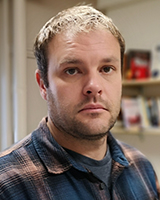
Robert (Bobby) Henry
Associate Professor, Indigenous Studies, University of Saskatchewan
Canada Research Chair Tier II, Indigenous Justice and Wellbeing
Dr. Robert Henry (Métis) is an Associate Professor in Indigenous Studies at the University of Saskatchewan. His research incorporates photo-voice methods and Indigenous methodologies, examining Indigenous health and wellbeing. He is leading a project that aims to improve public understanding about street gangs and street lifestyles through community engagement research, with a goal of informing policies that can help combat high rates of incarceration among Indigenous Peoples in the Prairie provinces. He is the Executive Director and Principal Investigator, nātawihowin and mamawiikikayaahk Research Networks (SK-NEIHR) and the Co-Principal Investigator, NEIHR National Coordinating Centre.

Sameera Hussain
Director, Strategic Integration, Office of International Affairs for the Health Portfolio
Adjunct Professor, School of Epidemiology and Public Health, University of Ottawa
Dr. Sameera Hussain is a health policy professional mobilizing systems thinking and strategic foresight at the intersection of policy, research, and practice. With extensive domestic policy experience and international field experience, her work is rooted in the principles of equity and decolonization.
Dr. Hussain is passionate about bridging the evidence to policy gap in health systems. She is committed to generating and mobilizing knowledge for effective, evidence-based public health policymaking that addresses the social, cultural, political, commercial, and environmental determinants of health in Canada and globally.
Her recent work includes senior policy roles in COVID-19 response and recovery at the Public Health Agency of Canada and a CIHR Health System Impact Fellowship (2017-2019).
Her international experience is rooted in ground level realities, primarily in countries of the Global South, where she did field research around the health needs of marginalized communities, working with global Indigenous groups in the Chittagong Hill Tracts (Bangladesh), Bangsamoro communities in the autonomous region of Mindanao (Philippines), and semi-rural communities in Afghanistan.
Dr. Hussain holds a doctorate in global health policy and degrees in political and development studies. In addition to serving on this board, Dr. Hussain is an editor with Globalization and Health Journal.
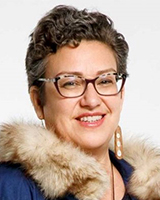
Karen Lawford, Ph.D. R.M., A.M.
Assistant Professor, Department of Gender Studies, Queen’s University
Dr. Karen Lawford (Ph.D., R.M., A.M.) is an Assistant Professor in the Department of Gender Studies at Queen's University. She is the first Indigenous midwife in Canada to obtain a doctoral degree and hold a university appointment. She advocates for comprehensive gender-inclusive sexual and reproductive health and care for Indigenous Peoples. Dr. Lawford is a founding member of the National Aboriginal Council of Midwives.

Candice Lys, PhD, M.S.M.
Founder & Executive Director – FOXY/SMASH
Research Associate, Aurora College
Dr. Candice Lys grew up in a very large Métis family in Fort Smith, NWT and now resides in Yellowknife. She holds a PhD in Public Health Science from the University of Toronto, a MA in Health Promotion from Dalhousie University, and a BA Honors (with First Class Honors) in sociology from the University of Alberta. She has nearly 20 years of experience as a community-based sexual and mental health promotion expert and researcher.
Candice is the Co-Founder/Executive Director of FOXY (Fostering Open eXpression among Youth) and SMASH (Strength, Masculinities, and Sexual Health). FOXY and SMASH are peer-led, trauma-informed, arts-based sexual and mental health programs that use the arts to facilitate discussion, education, and healing among Northern and Indigenous youth, reaching over 6000 youth to date. In 2014, FOXY was the first organization to be awarded the entire $1 million Arctic Inspiration Prize. Candice is recognized as the only Ashoka Fellow from the NWT and has earned the Meritorious Service Medal (Civil Division) from the Governor General of Canada, a 2020 Indspire Award for Education, and a CIHR Vanier Canada Graduate Scholarship, among numerous other awards.
She is a Mama to a little human Luca and a rambunctious beagle named Maple.
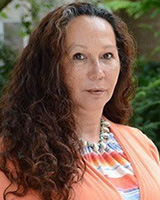
Dr. Dawn Martin Hill
Associate Professor, Indigenous Studies Program, Department of Anthropology, McMaster University
Dawn is Mohawk and resides at Six Nations with her family. She was the first Indigenous cultural anthropologist in Canada and continues to break barriers in education and research. Her primary research over two decades is working with women and youth to develop Indigenous ways of knowing strategies, holistic assessments of community wellness, traditional medicine and improving quality of life. She founded the Indigenous Studies Program at McMaster University as a graduate student, and more recently, the Haudenosaunee Environmental Health Task Force to build an infrastructure of environmental health research located on Six Nations. The HEHTF is currently exploring how Indigenous families’ wellness is impacted by lack of access to clean water. Dawn’s focus is on community-led research, Indigenous knowledge, and citizen science.
As a Principal Investigator, Dawn leads several Global Water Futures projects, including Co-creation of Indigenous Water Quality Tools and Ohneganos: Indigenous Ecological Knowledge, Training & Co-Creation of Mixed Method Tools. Ohneganos has partnerships with two communities, Six Nations of the Grand River in Ontario and Lubicon Lake Band of Little Buffalo in northern Alberta, and is working to address issues of water security and water sovereignty by grounding them in the health of the environment. Her all-female Haudenosaunee research team working on a project titled Tehtsitehwa: kenrotka: we (Together We Pull It From The Earth Again) – The Ohero:kon Youth Health Intervention (CIHR-IIPH), focuses on a rites of passage program for youth as a nation building strategy. Dawn has presented at the United Nations Permanent Forum on Indigenous Issues with her governance teams supporting young community women’s research on exploring environmental rights of Haudenosaunee women to land, water and bodies. Her team’s research is on multiple social media platforms under the name Ohneganos Ohnegahdę:gyo, including a video podcast Ohneganos: Let Talk Water podcast which recently receive the People’s Choice Award for the Future Ground Prize from the David Suzuki Foundation.
Dawn is a new member representing Canada on the UNESCO Hydrology Committee. She has been publishing Indigenous knowledge research since 1992, her book, Indigenous Knowledge & Power: the Lubicon Lake Nation in 1997 documents the impact of oil and forestry extraction in northern Alberta on the Lubicon people. She has numerous peer reviewed publications in Journal of Aboriginal Health, NAHO and other book chapters including a recent publication titled: Doctrine of Discovery: A Mohawk Feminist Response to Colonial Domination and Violations to Indigenous Lands and Women in Rowman and Littlefield Handbook, Women Studies in Religion, 2021. Dawn has also directed and produced three films on culture, women, and Indigenous community healing. She has worked diligently to conserve and protect Indigenous knowledge and language as founder of the Indigenous Elders and Youth Council and has longstanding partnerships with the Amazon Conservation Team, Kawenni:io immersion school, Six Nations Health Services, and Lubicon Cree Nations. Dawn is a leader in Indigenous ways of knowing and continues to advocate for Indigenous intellectual equity.
Referencing Joyce Tekahnawiiaks King (2007), “From the perspective of the traditional Haudenosaunee, we speak in terms of responsibilities with respect to water, not in terms of water rights. From time immemorial, we have held the view that the “law of the land” is not man-made law, but a greater natural law, the Great Law of Peace ….the root words for “rain” in Mohawk means expensive, or precious or holy’. Culturally, we would not abuse this resource”. Dawn’s specific research interests in traditional knowledge naturally highlights solutions in improving quality of life through attention to gender, governance, and well-being related to water quality.

Rod McCormick
Senior Professor, Indigenous Health, Thompson Rivers University
Dr. Rod McCormick (Kanienkehaka-Mohawk) is a Senior Professor and BC Government endowed Research Chair in Indigenous Health at Thompson Rivers University. Before moving to his partner’s home community of T’Kemlups te Secwepemc, Rod was a psychologist and counselling psychology professor at the University of British Columbia for 18 years. Dr. McCormick’s research focuses on community capacity building in mental health and research as well as the reclamation of traditional forms of healing. Dr. McCormick has been a clinician and consultant in Indigenous mental health for approximately 35 yrs. Dr McCormick is also a veteran having served as a naval officer for 6 years.
Professor McCormick was the lead for the CIHR funded BC Aboriginal Capacity and Developmental Research Environments, the BC and Western Arctic Network Environments for Aboriginal Health Research, and the Kloshe Tillicum network. He is currently the lead on the National/International Indigenous mentorship network Ombaashi, the indigenous undergraduate research training program: Knowledge Makers, as well as the All My Relations Indigenous Health Research Centre at TRU. He is an investigator with national initiatives such as Investigator Patient Oriented Research (SPOR) National Training Entity (NTE), the Ontario Network Environments for Indigenous Health Research, and the BC Network Environments for Indigenous Health Research.
In addition to previously serving on CIHR Institutional advisory and peer review boards, he currently serves on national and international advisories such as the Child Bright Network; as a core member of the national Expert Advisory Committee to provide advice and guidance for the reform of Indigenous Services Canada, as well as the international peer review committee for the Australian National Healthand Medical Research Council (NHMRC).

Tara Pride, PhD
Assistant Professor, Dalhousie University
Dr. Tara Pride is of mixed Mi’kmaw and settler ancestry and member of Sipekne’katik First Nation in Mi’kma’ki. She is a registered occupational therapist and Assistant Professor in the School of Occupational Therapy at Dalhousie University. Her research program encompasses three main areas including advancing Indigenous excellence in occupational therapy, Indigenous mentorship, and Indigenous community led- and driven- health research. She is currently working alongside Indigenous occupational therapists through the newly created Indigenous Occupational Therapy Collective of Canada not for profit. This Collective aims to create a space led by, and for, Indigenous occupational therapy students and clinicians. It also seeks to dismantle white supremacy and colonialism in occupational therapy practice, education, and research.
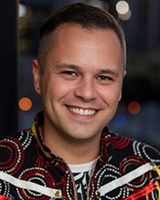
Jaris Swidrovich, PharmD, PhD
Assistant Professor, University of Toronto
Dr. Jaris Swidrovich (he/they) is an Assistant Professor and Indigenous Engagement Lead in the Leslie Dan Faculty of Pharmacy at the University of Toronto. He is a queer, Two Spirit, Saulteaux and Ukrainian pharmacist from Yellow Quill First Nation (Treaty 4 territory, Saskatchewan). His mother was a 60s Scoop survivor and his grandmother and great-grandmother both survived Indian Residential Schools.
He holds a Bachelor of Science in Pharmacy, a post-baccalaureate Doctor of Pharmacy, and a PhD in education. His primary areas of research and practice include pain, HIV/AIDS, substance use disorders, 2SLGBTQ+ health, and Indigenous health. As a Two Spirit, First Nations, and disabled person himself, Dr. Swidrovich brings a strong lens of equity, diversity, inclusion, intersectionality, and social justice to his research program.
Dr. Swidrovich is the Co-Scientific Director of the CIHR-funded Saskatchewan Network Environment for Indigenous Health Research (SK-NEIHR) called nātawihowin (“art of self-healing” in Cree), which is a First Nations Research Network that supports researchers, students, and First Nations health leaders and communities in Saskatchewan and beyond. Dr. Swidrovich is the founder and chair of the Indigenous Pharmacy Professionals of Canada, and also sits on several other local, provincial, and national boards, including The 519, Pain Ontario, Pain Canada, and the National Collaborating Centre for Indigenous Health.
Dr. Swidrovich is an active and engaged citizen of the several communities he belongs to and has been recognized with several awards and honours, including the Queen Elizabeth II Platinum Jubilee Medal for service to the community, the National Patient Care Achievement Award from the Canadian Pharmacists Association, and the Governor General’s Gold Medal.
- Date modified: